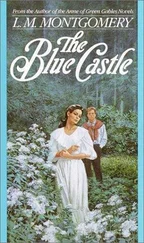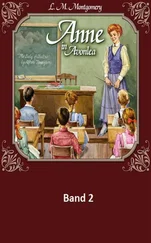The hemlocks were not the only mysterious trees about Cloud of Spruce. That lilac-bush behind the well, for example. Sometimes it was just lilac-bush. And sometimes, especially in the twilight or early dawn, it was a nodding old woman knitting. It WAS. And the spruce-tree down at the shore which in twilight or on stormy winter days looked just like a witch leaning out from the bank, her hair streaming wildly behind her. Then there were trees that talked - Marigold heard them. "Come, come," the pines at the right of the orchard were always calling. "We have something to tell you," whispered the maples at the gate. "Isn't it enough to look at us?" crooned the white birches along the road side of the garden, which Young Grandmother had planted when she came to Cloud of Spruce as a bride. And those Lombardies that kept such stately watch about the old house. At night the wind wandered through them like a grieving spirit. Elfin laughter and fitful moans sounded in their boughs. You might say what you liked but Marigold would never believe that those Lombardies were just TREES.
The old garden that faced the fair blue harbour, with its white gate set midway, where darling flowers grew and kittens ran beautiful brief little pilgrimages before they were given away - or vanished mysteriously. It had all the beauty of old gardens where sweet women have aforetime laughed and wept. Some bit of old clan history was bound up with almost every clump and walk in it, and already Marigold knew most of it. The things that Young Grandmother and Mother would not tell her Salome would, and the things that Salome would not Lazarre would.
The road outside the gate - one of the pleasant red roads of "the Island." To Marigold, a long red road of mystery. On the right hand it ran down to the windy seafields at the harbour's mouth and stopped there - as if, thought Marigold, the sea had bitten it off. On the left it ran through a fern valley, up to the shadowy crest of a steep hill with eager little spruce-trees running up the side of it as if trying to catch up with the big ones at the top. And over it to a new world beyond where there was a church and a school and the village of Harmony. Marigold loved that hill road because it was full of rabbits. You could never go up it without seeing some of the darlings. There was room in Marigold's heart for all the rabbits of the world. She had horrible suspicions that Lucifer caught baby rabbits - and ATE THEM. Lazarre had as good as given that dark secret away in his rage over some ruined cabbages in the kitchen-garden. "Dem devil rabbit," he had stormed. "I wish dat Lucifer, he eat dem ALL." Marigold COULDN'T feel the same to Lucifer after that, though she kept on loving him, of course. Marigold always kept on loving - and hating - when she had once begun. "She's got THAT much Lesley in her anyhow," said Uncle Klon.
The harbour, with its silent mysterious ships that came and went; Marigold loved it the best of all the outward facts of her life - better, as yet, than even the wonderful green cloud of spruce on the hill eastward that gave her home its name. She loved it when it was covered with little dancing ripples like songs. She loved it when its water was smooth as blue silk; she loved it when summer showers spun shining threads of rain below its western clouds; she loved it when its lights blossomed out in the blue of summer dusks and the bell of the Anglican Church over the bay rang faint and sweet. She loved it when the mist mirages changed it to some strange enchanted haven of "fairylands forlorn"; she loved it when it was ruffled in rich dark crimson under autumn sunsets; she loved it when silver sails went out of it in the strange white wonder of dawn; but she loved it best on late still afternoons, when it lay like a great gleaming mirror, all faint, prismatic colours like the world in a soap-bubble. It was so nice and thrilly to stand down on the wharf and see the trees upside down in the water and a great blue sky underneath you. And what if you couldn't stick on but fell down into that sky? WOULD YOU FALL THROUGH IT?
And she loved the purple-hooded hills that cradled it - those long dark hills that laughed to you and beckoned - but always kept some secret they would never tell.
"What is over the hills, Mother?" she had asked Mother once.
"Many things - wonderful things - heart-breaking things," Mother had answered with a sigh.
"I'll go and find them all sometime," Marigold had said confidently.
And then Mother had sighed again.
But the other side of the harbour - "over the bay" - continued to hold a lure for Marigold. Everything, she felt sure, would be different over there. Even the people who lived there had a fascinating name - "over-the-bay-ers" - which when Marigold had been VERY young, she thought was "over-the-bears."
Marigold had been down to the gulf shore on the other side of the dreamy dunes once, with Uncle Klon and Aunt Marigold. They had lingered there until the sunken sun had sucked all the rosy light out of the great blue bowl of the sky and twilight came down over the crash and the white turmoil of the breakers. For the tide was high and the winds were out and the sea was thundering its mighty march of victory. Marigold would have been terrified if she had not had Uncle Klon's lean brown hand to hold. But with him to take the edge off those terrible thrills it had been all pure rapture.
Next to the harbour Marigold loved the big spruce wood on the hill - though she had been up there only twice in her life.
As far back as she could remember that spruce hill had held an irresistible charm for her. She would sit on the steps of Old Grandmother's room and look up it by the hour so long and so steadily that Young Grandmother would wonder uneasily if the child were just "right." There had been a half-wit two generations back in the Winthrops.
The hill was so high. Long ago she had used to think that if she could get up on that hill she could touch the sky. Even yet she thought if she were there and gave a little spring she MIGHT land right in heaven. Nothing lived there except rabbits and squirrels - and perhaps "de leetle green folk," of whom Lazarre had told her. But beyond it - ah, beyond it - was the HIDDEN LAND. It seemed to Marigold she had always called it that - always known about it. The beautiful, wonderful Hidden Land. Oh, to see it, just to climb up that hill to the very top and gaze upon it. And yet when Mother asked her one day if she would like a walk up the hill Marigold had shrunk back and exclaimed,
"Oh, Mother, the hill is so high. If we got to the top we'd be above EVERYTHING. I'd rather stay down here with things."
Mother had laughed and humoured her. But one evening, only two months later, Marigold had daringly done it alone. The lure suddenly proved stronger than the dread. Nobody was around to forbid her or call her back. She walked boldly up the long flight of flat sandstone steps that led right up the middle of the orchard, set into the grass. She paused at the first step to kiss a young daffodil goodnight - for there were daffodils all about that orchard. Away beyond, the loveliest rose-hued clouds were hanging over the spruces. They had caught the reflection of the west, but Marigold thought they shone so because they looked on the Hidden Land - the land she would see in a moment if her courage only held out. She could be brave so long as it was not dark. She must get up the hill - and back - before it was dark. The gallant small figure ran up the steps to the old lichen-covered fence and sagging green gate where seven slim poplars grew. But she did not open it. Somehow she could not go right into that spruce wood. Lazarre had told her a story of that spruce wood - or some other spruce wood. Old Fidèle the caulker had been cutting down a tree there and his axe was dull and he swore, "Devil take me," he said, "if I don't t'row dis dam axe in de pond." "AN' DE DEVIL TOOK HEEM." Lazarre was dreadfully in earnest.
Читать дальше


